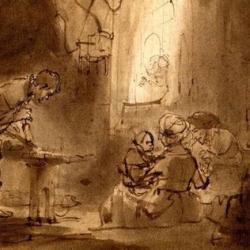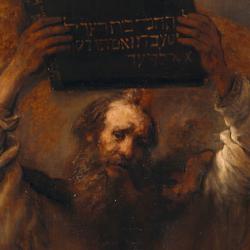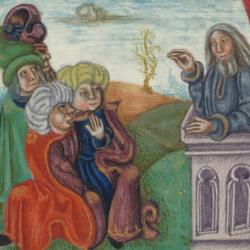In Exodus, Israel moves, as James Jordan has long said, from slavery to Sabbath. That is a beautiful summary of the book, but it must be filled out. The full movement is from slavery to Sinai to Sabbath. Sinai is a way-station, and a necessary one, on the way to Sabbath.
Sinai is the mountain of covenant-making. Yahweh descends to Sinai as Israel’s Father, Master, Lord, Deliverer. He comes also as Israel’s Lover to adorn her with the treasures of Egypt, to put dugong slippers on her feet and to spread the wing of His robe over her. Israel reaches Sabbath only insofar as she enters covenant with Yahweh as His Bride.
Sinai is the mountain of Torah. God’s statutes and ordinances are rooted in redemption, the commandments of the God who brought Israel from Egypt. But they are commandments, which Israel must obey if she wants to enjoy the abundance that Yahweh promises. Israel reaches Sabbath insofar as she is obedient Bride.
I cannot overstate the importance of this point. In the past decade or so, the Evangelical world has been rocked by fresh waves of antinomianism, sometimes with tragically scandalous results. Grace, it is said, delivers us from all law, all demand, every imperative but the imperative of the Spirit, which in practice is often no more than the imperative of my own desires. When exodus is our paradigm of redemption, we see clearly that we are delivered to become God’s poiema, His craft-work, “created in Christ Jesus for good works, which God prepared beforehand so we could walk in them” (Ephesians 2:10).
Sinai is the holy mountain, where Yahweh reveals the pattern for His earthly sanctuary. In seven speeches, God instructs Israel how to construct His house and its furnishings. The speeches mimic the creation week; God speaks a world into being. But at Sinai there is something new: God speaks words that bring a new creation only if they are obeyed. Yahweh’s word transforms the world only as Israel conforms to Yahweh’s word.
At the very end of Exodus, Yahweh descends from Sinai to take His Sabbath throne above the cherubim in the Most Holy Place. Yahweh occupies His place of rest only because Israel has obeyed the creative, seven-fold speech of God. God speaks a new world into being, but that new world is mediated and actualized through human action. Israel comes to Sabbath – she shares Yahweh’s rest – only insofar as she is the obediently creative Bride, the creatively obedient Queen at the right hand of her divine husband.
We can take one further step: The church herself is the temple of God, the dwelling of the Spirit. As she obeys the creative Word of the Creator, the church builds herself up in glory. Gifted by the Spirit, she edifies herself, forming herself as an edifice in which the Lord is pleased to dwell.
Pastors are called to the thrilling work of gathering and guarding the Bride of God at the mountain of God; called to teach her God’s commandments and require obedience; because, finally, this obedience is the way the Bride participates in God’s work of new creation – the new creation that is the Bride, the new creation that is the shared Sabbath enthronement of God and new humanity.














